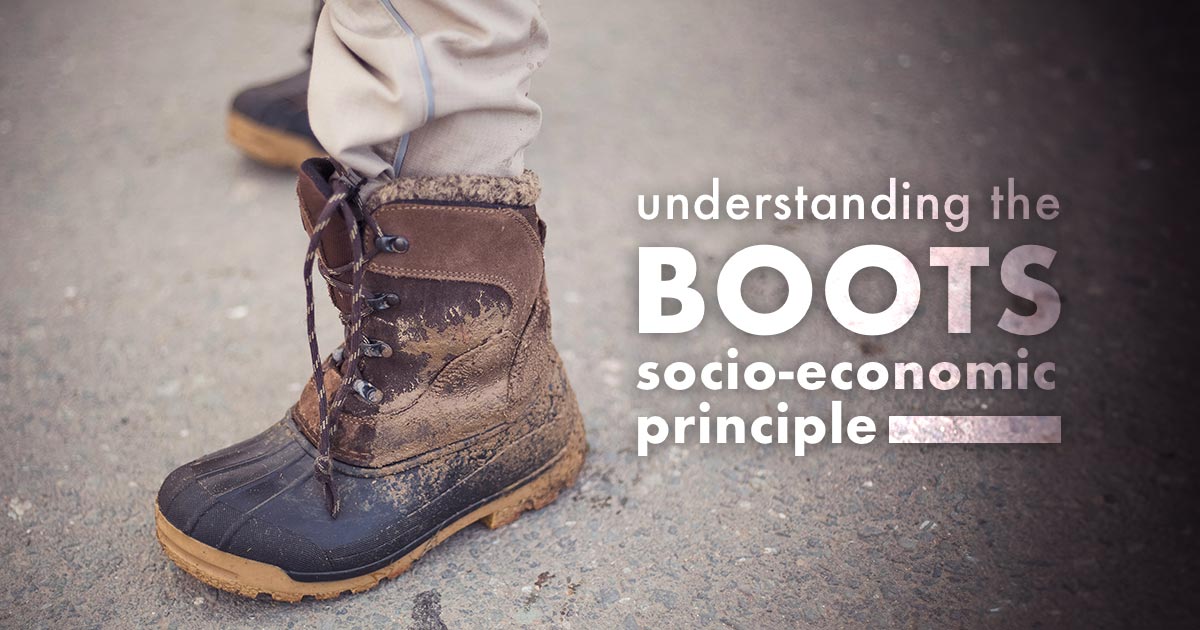The High Cost of Poverty: Explaining the Economic Idea of Boots

Have you ever wondered why poverty seems so great? It’s not just complaints from people facing financial hardship; It is a sad fact. Being poor actually drives up prices, making it very difficult for people with limited resources to optimize their financial situation.
This idea isn’t new. Terry Pratchett, an English writer, discussed “Boots’ economic theory” in his 1993 book Men at Arms. This theory shows why there’s a large gap in money and chances between the rich and the poor. Let’s look into this.
Understanding Boots Theory:
In summary, the Boots Theory of Economics provides a straightforward explanation for why people fail to get out of poverty. In Pratchett’s story, Samuel Vines, a lower-class sea captain, considers the contrasts between poverty and luxury, focusing on spending patterns.
Modern Uses of Boot Theory:
You might be curious, “How does a part from an old book relate to my money?” That’s a good question, and the answer is straightforward. Even though Captain Vines teaches us about boots, the idea can be used for many parts of spending, saving, and overall financial health. It usually involves choosing between quick gains and long-term benefits, which is a typical problem for people with not much money. Let’s see how Pratchett’s Boot Theory shows up in today’s world and adds to the high costs of being poor.
Buying Low-Quality Items:
The phrase “you get what you pay for” is true for many things, like boots and electronics. Picking cheaper options often means they won’t last long and need to be replaced often, which costs more in the long run.
Putting Off Repairs:
Not fixing small issues because of money problems can lead to bigger issues later, which means more expensive repairs—this cycle keeps going because of being poor.
Inability to Purchase in Bulk:
Buying in bulk saves money over time, but constrained budgets make it difficult to capitalize on such savings, requiring individuals to pay higher unit prices for lesser quantities.
Limited Space and Household Chores:
Not having enough room to store things and access to things like a washing machine at home makes doing simple chores at home more expensive and time-consuming.
Time Limits:
People with low income often spend more time doing everyday tasks like traveling to work and washing clothes, which leaves them with less time to earn money.
The Effects of Poor Credit Ratings:
Having a poor credit rating means you’ll pay more for loans, have fewer job options, and find it harder to get a place to live, which makes it tougher for those who are already struggling financially.
Addressing the Cost of Poverty:
Unfortunately, there isn’t a simple solution to escape the cycle of poverty in today’s economy. However, taking small actions such as picking useful items, saving for unforeseen events, and smartly using extra cash can gradually help improve financial situations.
In Summary:
Escaping poverty takes time, giving up some things, and a little bit of luck. By making wise financial decisions and focusing on long-term goals, people can slowly lessen the difficulties of poverty. Pratchett’s ideas remain important today, highlighting the hidden costs and challenges faced by those trying to get by with limited resources.

Senior Writer • Business and Information Trends Writer
Lucas writes long-form, investigative articles that explore the deeper implications of business and information advancements.

